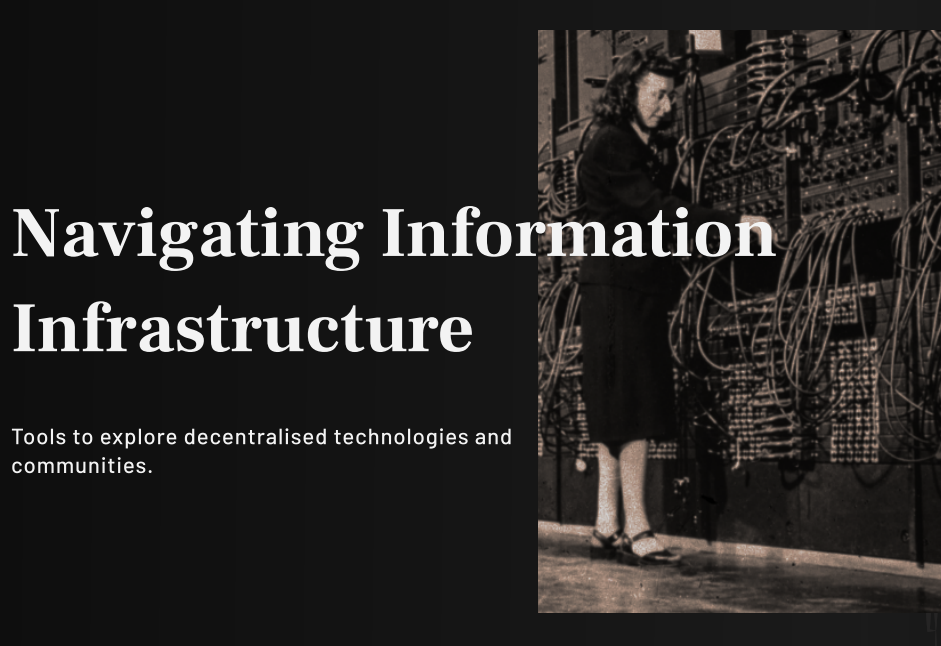“Navigating Information Infrastructure” Blends Art & Technology in a New Experiment to Empower the Science Commons
BlockScience research continuously pushes the boundaries of new technologies that are coming available in “Web 3.0” and beyond. One of our latest experiments was an open research collaboration exploring networked media that fuses art and technology in the pursuit of funding research and development; a proof of concept for leveraging web3 technologies to empower the science commons.
The Making of a Zine
The subject of this open research collaboration was a collection of articles written over the past year by Michael Zargham and Kelsie Nabben, along with co-authors Primavera de Fillipi, Joshua Tan, Danilo Lessa Bernardinelli and Jeff Emmett. This collection was curated to explore social and technical topics relevant to decentralized information infrastructure. It was then hosted on IPFS and minted as NFTs. The result: a good old fashioned Zine exploring the frontiers of “Navigating Information Infrastructure”, created using the very digital public infrastructures that the collection itself discusses.
“Since the emergence of the internet, there have been various attempts at mapping Cyberspace in order to interact with it across various but distinct disciplines, including computer engineering, law, and economics. These varied perspectives have tackled the questions of ‘how do we build it?’, ‘how do we measure it?’, ‘how do we govern it?’, and ‘how do we fund it?’. In this collection of articles, we ask: ‘how do we simultaneously navigate and build digital territory?’.
The scaffolding of Cyberspace is infrastructure which provides the foundation for the essential services which govern and serve society. We want to understand it, engage with it, and shape it in more purposeful and meaningful ways.”
- 00. Navigating information Infrastructure
Web3 technology has made it possible to explore this intersection of research, art, and technology, but co-author Kelsie Nabben sees this collection as pushing boundaries on even more dimensions:
“Web3.0 offers a space to explore new modalities for research and science. While this Zine is a cartographic mapping exercise — an exploration of decentralized digital technology, it is also an exploration of open science, self publication, and peer-to-peer scientific discourse.
Zine’s are retro. What we’re trying to do here is make the medium the message by blending the old with the new: a value for academic rigor and peer-review (informal and thanks to colleagues and friends for feedback), and self-determination, permissionlessness, and self-governance.”
- Kelsie Nabben, Co-author
Ongoing experimentation
This is far from the first experiment in this direction. BlockScience proudly supports the #OpenScience movement, such as the research of our friends and collaborators at P1anck who have been innovating heavily in using NFTs for research citation & retroactive value attribution networks. Other open science initiatives have included collaborations with the Token Engineering Academy on community research programs modeling RAI, HydraDX, and GitcoinDAO, as well as driving development of the open source simulation tool cadCAD.
While open science lowers the barrier for public access to exciting insights, the main takeaway from this Zine collection is not limited to the information in the publications, but also the importance of acknowledging contributors and maintaining appropriate citations between derivative works.
On that note, we would like to extend a huge thank you to contributing authors and long-term collaborators: Jeff Emmett, Primavera Di Fillipi, Josh Tan, Danilo Lessa Bernardineli, as well as those who provided valuable feedback and production work, including Jessica Zartler from BlockScience and Professor Ellie Rennie from RMIT University. Credit for the artistic design work goes to Vicky Plashevska and Max Kudinov from Magic Powered, and many thanks to Matt Stephenson of P1anck and Nico Rodriguez of MetaVision Labs for many hours of technical support in launching this endeavor. And finally, a number of collaborating organizations that supported this initiative — P1anck, MetaGov, Commons Stack, SourceCred, RMIT Blockchain Innovation Hub, the Token Engineering Commons, and GitcoinDAO.
Own the NFT
If you are interested in owning a piece of this experiment, one edition of the intro piece of the collection is on auction on Open Sea until Saturday, April 9 at 11:52am EDT (3:52pm UTC) — place your bids now!
Each chapter of the Zine was donated to the participating organizations who made this effort possible, and each org may choose to keep its NFT or list it for sale at a future date. All proceeds will go to supporting open research, so we can continue to do more of it! (Keep in mind that all research and content contained within the Zine is open source, and NFT ownership is a means of patronage of open science rather than any exclusive claim to IP).
Read the Zine
To read the Zine in full, you can access each piece on IPFS below:
00. Navigating Information Infrastructure
III. Engineering Ethics in Web3
IV. An Ethnography of Decentralised Information Infrastructure
V. “Ad Hoc” Decentralised Digital Infrastructure
VII. Exploring DAOs as Institutions
IX. Towards Computer-Aided Governance
X. Deterring Adversarial Behavior
Article by Peter Hacker with edits by Jeff Emmett, Jessica Zartler, Dr. Michael Zargham and Kelsie Nabben.


